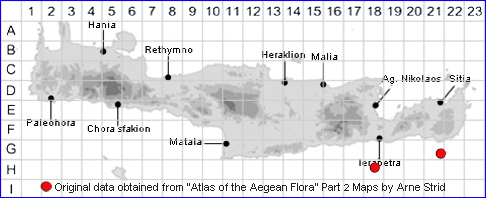
SPECIES DESCRIPTION
AGALUS PEREGRINUS subsp, PEREGRINUS
Family and Genus:- See- LEGUMINOSAE/Subgen. TRIMENIAEUS
Common Name:- None
Homotypic Synonyms:- None
Meaning:- Astragalus (Gr) Ankle-bone, (a plant with knotted roots).
Peregrinus (L) Strange, foreign, exotic.
General description:- Annual with a fairly stout taproot.
Stems:-
1) Up to 50 cm, robust, procumbent.
Leaves:-
1) Imparipinnate, rather small (2-8 cm).
a) leaflets, 6-9 pairs, oblong or obovate, emarginate or truncate, glabrescent on
both sides but with long, patent white hairs on the margins.
Flowers:-
1) Peduncles, straight, ± equalling the subtending leaf.
2) Racemes, lax, short, with (1-)2-4 short-pedicellate flowers.
3) Calyx, 7-11 mm, shortly tubular:
a) teeth, 2/3-3/4 as long as the tube. with a mixture of black and white, long,
erecto-patent hairs.
4) Corolla, pale tawny violet to purple.
a) standard, 15-18 mm.
b) wings, longer than the keel.
Fruit:-
1) Legume, 40-60 x 7 mm, linear-lanceolate, straight or scarcely curved, circular in
transverse section, grooved beneath.
a) beak, straight.
b) valves, not keeled, rugose-tuberculate, with sparse, appressed hairs.
Key features:-
1) Valves of legume, not or obscurely keeled.
2) Calyx, at least 8 mm; standard at least 15 mm.
3) Legume, 28-40 x 5-6 mm, cylindrical, patent-pilose, dehiscing tardily.
Habitat:- Dry, sandy places and steppe-like communities near the sea, 0-180 m.
Distribution:- Rare in Greece, known only from Thlra (Santorini) and small islands
off SE Crete. - A S Mediterranean taxon otherwise found in N Africa, Palestine and
Jordan tsubsp. peregrinus).
Flowering time:- March-April..
Photos by:-
